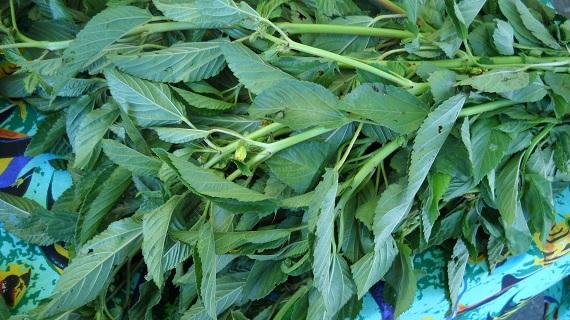Jute leaf, popularly called ewedu among the Yoruba, ahinghara in Igbo and rama in Hausa, is a popular vegetable in West Africa. The botanical name is Corchorus olitorius (Fam: Malvaceae).
Constituents
Ewedu contains almost all of the nutrients needed by humans. It is rich in carotenoids, vitamins A C, B, K, Folic acid, calcium, potassium and iron and dietary fibres. It is also rich in both essential and non-essential amino acid, such as lysine.
Preparations
The leaves and tender shoots are eaten. Ewedu may be boiled (alone or with locust beans, lemon or olive oil), dried steamed or pureed, mixed with chicken, or prepared into soup. Jute leaves are used to flavour soups, stews, teas, and vegetable dishes. Dried leaves can be used as a thickener in soups. Young leaves are added to salads. The leaves and roots may be prepared as cold infusion or decoction.

Pharmacological actions and medicinal uses
Jute is a traditional remedy for aches and pains, fever, dysentery, enteritis, pectoral pains, and tumours. Leaves are used for ascites, pain, piles, cystitis, dysuria, gonorrhea and tumours. The cold infusion is said to restore appetite and strength. An infusion is used in the treatment of liver disorders and dyspepsia. The leaf is a good anti-anaemic which prevents anaemia due to its high iron content and also facilitates the production of red blood cells.
The jute leaf has been known to be a remedy for pregnant women experiencing prolonged labour. It has also been discovered to aid milk secretion in lactating mothers. Ewedu helps in overcoming the problems that occur from premenstrual symptoms (PMS) and maintaining the menstrual cycle regularly. It has also been advised by researchers that women going through menopause should take more of this vegetable.
Jute plant consists of a considerable amount of Vitamin K which is helpful in reducing the threat of bleeding in the liver, poor nutrient absorption, jaundice or the combination of long term use of antibiotics or aspirin.
Regular consumption of jute plant is believed to help slow the start of certain eye diseases, including age-related macular degeneration.
Jute plant consists of a sufficient amount of magnesium that is required for the body. Therefore frequent consumption is recommended to normalise asthma-related problems such as wheezing and breathlessness.
Ewedu is said to lower blood pressure and cholesterol. It is good for heart health and diabetes, and can increase sexual libido and aid fertility. It is also a blood purifier and laxative.
In fact, dieticians call jute “a pharmacy on your plate” due to the numerous nutritional health benefits associated with it.
Adverse effects
Ewedu should be avoided when taking antibiotics like ciprofloxacin in order not to reduce their effectiveness. It should also be avoided in first and second trimesters of pregnancy.
Economic potentials
The stem of the plant can be burnt as firewood. The stalks are used for industrial products like rope, pulp, paper, fibre and composites. The fibre is used for making gunny bags, rugs, ropes, carpets, rough cloth and many other similar articles of daily use.
Light and soft wood is used in making sulphur matches. Ewedu leaves can be used to make cosmetics like face masks, creams and serums.











Thanks a lot I apreciat .
God bless jute leaves. I experienced something terrible which I can not explain. The spirit of God reminded me of ewedu aka jute, I started drinking it like water. 3to4 times daily. Now I am better. It has also taken care of other issues.
I recommend it for everyone.
Found your site on Reddit today and really liked it.. I bookmarked it and will be back to check it out some more later. http://www.piano.m106.com